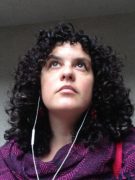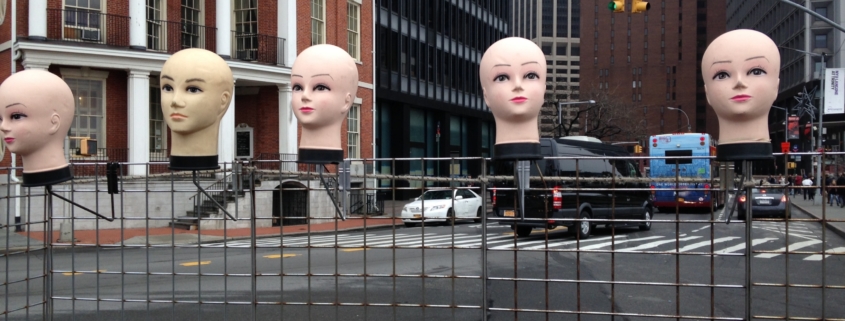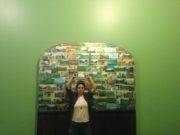Why I Write About Whiteness
There was a time in my life when I entertained the idea of saying the following out loud—“I do not identify as white.”
I considered saying this because in my cultural studies classes, at my liberal arts college, I had learned that race was a construct and that the concept of race was created by white people through a history of violence. I thought that I needed to disassociate myself from whiteness and disavow my privilege. Clearly this was misguided. I wasn’t sure how to proceed with my knowledge about race. Racial identity does not exist as an inherent truth, yet race has enormous impact on our day-to-day lives and our identities. I could not simply claim the philosophical high ground and extricate myself from race.
I have been many people in pursuit of who I am now, twenty years older, all the time skirting the edge of understanding whiteness. All the time, not wanting to dive in. Now, as I move deeper into writing personal nonfiction and I dance around different versions of truth, I find whiteness popping up in all my narratives. This is not exactly an organic process. It is due to the hard work of many people of color in academia, activism, and the arts who have labored to teach us white people to see ourselves. In addition to those conscious efforts, I owe a great debt to the daily effort required of POC to simply exist within the institutionalized racism of our country. The labor of people of color from the working class through academia and the arts is commodified, yet the lives and bodies of POC are consistently undervalued, abused and destroyed. I owe a debt because I have benefitted from this unfair arrangement and now as a writer, the work being done to undo racial injustice has lead me to a missing piece.
To narrate many of my stories of growing up in this country, I must include whiteness. If I do not seek to define that which everyone says I am, that shapes so much of this experience in America, aren’t I missing something in the story?
* * *
Why do so few white writers write about race? When in our literature do we acknowledge that we are white? That whiteness has a history? When do we explore our connections to that history? No, not your family history, that is, of course, interesting, but what about your families’ histories of being white? What about your whiteness? The thing that makes you feel safe calling the police? The thing that makes it OK for you to write science fiction or nature poems or literary novels? The reason no one asks you where you are from? When do you write about that?
So many of the writers I admire, authors who are fundamental to American literature, are not white. Many of their stories allude to, or are precisely about, their non-whiteness. But how many writers speak of their whiteness and how it shaped their story? I don’t mean their Italian-ness, Irish-ness or Scandinavians-ness. I refer to the much more elusive identity, which I share, and which protects me from being followed in stores, allows me to feel like I am somehow neutral, that all stories are about my race, unless otherwise noted. Am I affected by our history of colonialism and slavery? Do I benefit from being part of the ruling class? Yes. Yes. And so when I write about myself, I am also writing about whiteness. I write about whiteness to connect with the unseen forces in my life. In her essay, “White Debt,” Eula Biss, a white writer who often writes about whiteness says:
“Refusing to collude in injustice is, I’ve found, easier said than done. Collusion is written onto our way of life, and nearly every interaction among white people is an invitation to collusion. Being white is easy, in that nobody is expected to think about being white, but this is exactly what makes me uneasy about it.”
I write about whiteness because my life is better for having read Their Eyes Were Watching God, The Bluest Eye, Zami: A New Spelling of My Name, Dreaming in Cuban, and Fences while I was in high school. Our culture is better for having these works. They are stories about the human condition that reflect parts of our culture back at us and describe the American experience. I related to the characters’ experiences of confusion and isolation. In her essay, “Representing Whiteness in the Black Imagination,” bell hooks describes the shock her white students express when they become aware that Black people both observe and are critical of whiteness. They don’t believe that whiteness has attributes, style, a way of seeing. They are invested in “whiteness as a mystery,” she writes. White people have not wanted to be seen. hooks continues to link this attitude to the history of slavery. Black slaves were “brutally punished for looking, for appearing to observe the whites they were serving, as only a subject can observe, or see.” I happen to love Black, Latino and Indigenous literature, but I do not want that appreciation to be a spectator sport, where I get to sit back and enjoy. They see me and I work to see myself.
* * *
It is through stories that I have come to understand whiteness. And often, they are the stories told by writers of color. hooks tells a story about being interrogated in an airport, being asked questions that white people are not being asked. She writes, “It is useful, when theorizing black experience, to examine the way the concept of ‘terror’ is linked to representations of whiteness.” I want to explore the shameful unintentional moments when my identity causes terror. Was I oblivious to the power I had? Was it tingling under my skin?
I write about whiteness because I want to know more about this identity, which has only ever really been defined by the opposite of Blackness. In an article for Esquire about Jordan Peele’s movie Get Out, Jordan Thrasher writes:
“If you go back far enough in slavery history, you start to understand that it is the theft of bodies that were Black, captured by bodies that were white, which created the concept of race itself. Race is the theft of Black bodies, further developed as white people committed genocide against Native people, colonized Mexican people, and imported Chinese people for dangerous labor (before being excluded).”
I write about whiteness so I can understand that, “Hey, I am not all white people,” while probing how I am like all white people. There is depth there and it is the kind of depth that makes stories rich.
Being seen all the time is work, and as white people, we have not had to do that work. In her essay, “Back to Buxton,” Eula Biss describes how she felt after a few years of being in the minority in her neighborhood in Brooklyn:
“I was tired of being seen, and worse, of seeing myself be seen. I was tired of that odd caricature of myself that danced in front of me like a puppet as I walked through the streets of places where my race was noticed. In those places I saw, as I imagined everyone else did, my whiteness, dancing there, mocking me, daring me to try to understand it” (123).
I want to know who I belong to and what belongs to me. So I can be accountable and so I can make a home.
I write about whiteness so I can uncover what people are hiding from. In her essay, “Relations,” Biss writes, “What exactly it means to be white seems to elude no one as fully as it eludes those of us who are white” (31).
In the introduction to the anthology The Racial Imaginary: Writers on Race in the Life of the Mind, Beth Loffreda and Claudia Rankine write:
“… they know that they are white, but they must not know what they know. They know that they are white, but they cannot know that such a thing has social meaning; they know that they are white, but they must not know that their whiteness accrues power. They must not call it whiteness because to do so would be to acknowledge its force.”
I write about whiteness so I can examine what we are hiding in.
I write about whiteness so whiteness can have texture.
I write about whiteness because I can’t say I am not something if I don’t know what it is.
I write about whiteness because I want to be an American writer and whiteness is so very American. How can we pretend it doesn’t exist?
Around the same time that I wondered whether nor not I would call myself white, I read Gloria Anzaldua’s Borderlands: The New Mestiza. I circled these words:
“To survive the Borderlands/ you must live/ sin fronteras/ be a crossroads” (195).
And I wanted to be a crossroads. But I didn’t know what that meant. I didn’t realize that my whiteness was a crossroads. It was the place where I could stop and listen and sit—sometimes in extreme discomfort. Where I could move past guilt and make space for others to cross and to cross with them again and again.
Anzaldua, Gloria. Borderlands/ La Frontera: The New Mestiza. Aunt Lute Books, 1987.
Biss, Eula. Notes from No Man’s Land: American Essays. Graywolf P, 2009.
hooks, bell. “Whiteness in the Black Imagination.” Killing Rage: Ending Racism. Henry Holt and Co., 1995, pp. 31-50.
 Meredith Arena is from New York City and resides in Seattle where she works as a teaching artist in the public schools and facilitates meditation for adults. She is a student in the MFA program at Antioch University Los Angeles. She is a Creative Nonfiction Editor on Lunch Ticket. Her work has appeared in Entropy, Lunch Ticket and SHIFT Queer Literary Arts Journal.
Meredith Arena is from New York City and resides in Seattle where she works as a teaching artist in the public schools and facilitates meditation for adults. She is a student in the MFA program at Antioch University Los Angeles. She is a Creative Nonfiction Editor on Lunch Ticket. Her work has appeared in Entropy, Lunch Ticket and SHIFT Queer Literary Arts Journal.






